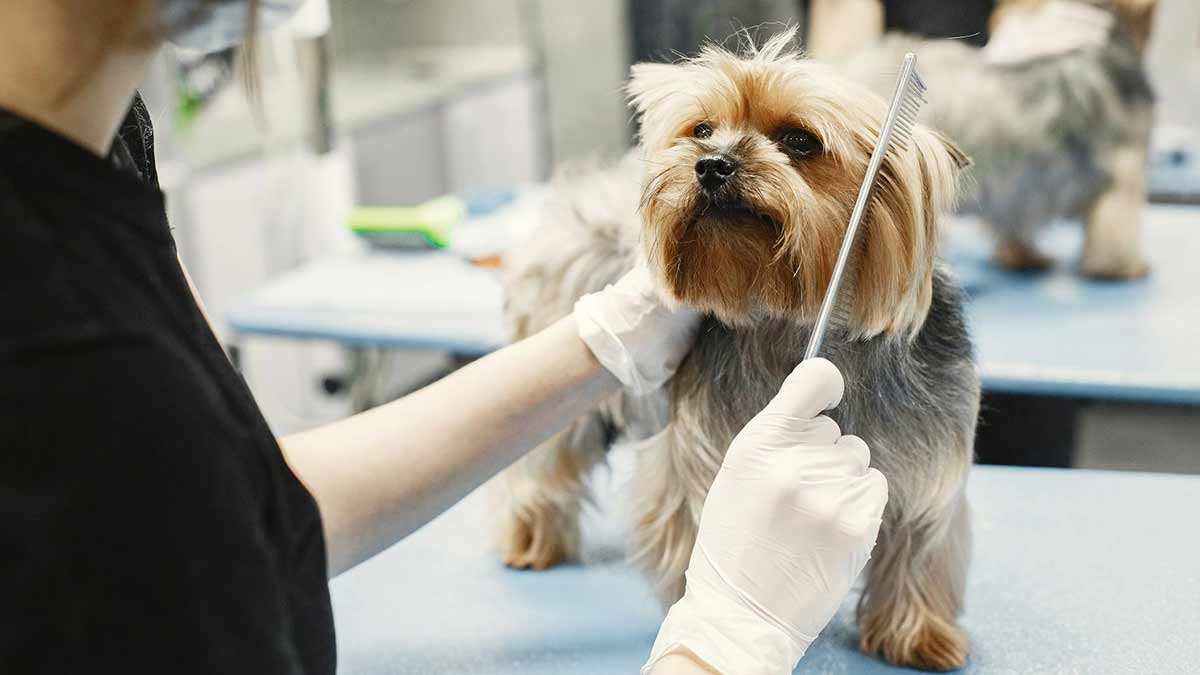Table of Contents
As a pet owner, have you ever wondered how to get your dog to sleep through the night?
We all know the joy of having a furry companion, a faithful friend who brightens our days and fills our hearts with love.
Just like us, our dogs need a good night’s sleep to stay physically and mentally healthy.
In this article, I’ll look at the importance of ensuring your dog gets a restful night’s sleep, and give you some valuable insight into how to make it happen.
And, from the benefits of sleep to the factors that affect your dog’s sleep needs, I’ll cover it all.
So, let’s embark on a journey to understand the importance of a good night’s rest for your four-legged family member and find effective ways to ensure they sleep through the night, fueling a happy and healthy life for you and your canine companion.
Let’s the journey begin!

Importance of Dog Sleep at Night
You know very well that dogs are beloved members of families.
Just like humans, dogs need adequate rest to maintain their physical and mental health. Creating the right environment for them to get a good night’s sleep is critical to their overall well-being.
Now I will share with you the importance of dog sleep at night and why it is essential to the health and happiness of your furry friend.
1. Physical Health
You should definitely know that dogs need enough sleep to stay healthy regardless of their age or breed.
During deep sleep, the body repairs and regenerates tissues and strengthens the immune system. Also, maintaining a healthy metabolism and sleep is an essential factor.
Remember that prolonged sleep deprivation can weaken the immune system and make dogs more susceptible to illness.
2. Mental Health
Sleep plays a significant role in a dog’s mental health. It helps consolidate memory, process information and improve learning.
Dogs that don’t get enough sleep can become irritable and anxious and exhibit behavior problems.
Always remember that adequate sleep contributes to a happy and balanced dog.
3. Emotional Wellbeing
Dogs are very sensitive animals and can experience emotions just like humans.
A good night’s sleep can reduce stress and anxiety, and help your dog feel more relaxed and secure.
I have researched and found that dogs who sleep well at night are generally more emotionally stable and less prone to behavioral problems.
4. Energy Levels
Dogs are naturally active creatures, and they need energy to be playful and exercise.
A full night’s sleep ensures your dog wakes up refreshed and energized, ready for a day of fun and exercise.
Always keep in mind that it is the foundation of maintaining an active and healthy lifestyle.
5. Improved Training and Obedience
It is a well-studied fact that training a dog is easier when he is well rested. A dog that has had a good night’s sleep is more attentive and responsive to training commands.
Ensuring your dog gets quality sleep at night can improve their ability to learn and follow instructions.
6. Prevent Health Problems
Chronic sleep deprivation in dogs can lead to a host of health problems, including obesity, diabetes and cardiovascular problems.
Be sure to remember that by making sure your dog to sleep through the night, you can significantly reduce the risk of these potential health complications.
7. Stronger Bond with Your Pet
Spending quality time with your dog is essential to strengthening your bond.
Dogs who sleep well at night are more content during the day, making them more fun companions.
A well-rested dog is more likely to be loving and loyal.
Finally, the importance of dog sleep at night cannot be overstated. It directly affects your dog’s physical and mental health, emotional well-being and even their relationship with you.
By ensuring your furry friend gets a peaceful night’s sleep, you contribute to their overall happiness and longevity.
What Factors Affect a Dog’s Sleep Needs?
You know your pet needs a good night’s sleep, but have you ever wondered what factors affect a dog’s sleep?
Understanding the factors that affect a dog’s sleep needs is critical to providing the best care for your furry friend.
Every dog is unique and different factors can affect their sleep patterns and needs.
Below I will outline for you some key factors to consider.
1. Age
A dog’s age plays a significant role in their sleep needs.
For example, puppies need more sleep than adult dogs. They can sleep up to 18-20 hours a day to support their rapid growth and development.
As dogs get older, their sleep patterns tend to stabilize, but they still need adequate rest.
2. Breeds
Did you know that different breeds have different energy levels and sleep needs?
Highly active breeds such as Border Collies or Siberian Huskies may need more sleep to recover from their physical activity, while smaller, less active breeds may need less sleep.
Knowing your dog’s breed characteristics can help you gauge their sleep needs.
3. Health and Wellness
A dog’s health can directly affect their sleep patterns. Illness, pain or discomfort can disrupt a dog’s sleep.
If your dog is experiencing sleep disturbances, I would advise you to consult a veterinarian to rule out any underlying health issues that may be affecting their sleep.
4. Exercise and Activity Level
Dogs that get regular exercise tend to sleep better at night. Physical activity helps tire them out, making it easier for them to relax and sleep better.
Keep in mind that if your dog doesn’t get enough exercise during the day, they may have excess energy at night, which can disrupt their sleep.
5. Mental Stimulation
Physical exercise is just as important as mental stimulation for a dog’s well-being.
Dogs that are exposed to mental challenges, such as puzzle toys or training exercises, tend to sleep more contentedly.
In general, a mentally stimulated dog is less likely to be restless at night.
6. Food and Feeding Schedule
Even if you don’t pay much attention to this factor, the timing of meals and the type of food your dog eats can especially affect their sleep.
Feeding your dog close to bedtime can cause digestive problems and night wakings. I usually recommend you feed your dog a few hours before bed.
7. Environment
The environment your dog sleeps in can also affect the quality of their sleep.
Make sure their sleeping area is comfortable, quiet and undisturbed. A comfortable and familiar sleeping position will help your dog feel safe and relaxed.
8. Routine and Conformity
Are you aware that dogs thrive on routine and consistency?
Having a regular schedule for bedtime and wake-up times will help regulate your dog’s internal clock, making it easier for them to sleep through the night.
9. Separation Anxiety
Even if you don’t think about it too much, remember that dogs have minds just like humans. Even dogs that experience separation anxiety and your furry pet may struggle with sleep when left alone.
Addressing separation anxiety through training and positive reinforcement is essential to help your dog feel more comfortable when you are not around.
10. Temperature
Extreme temperatures, too hot or too cold, can affect your dog’s sleep.
Make sure the sleeping area is at a comfortable temperature and adjust it as needed to ensure your dog to sleep comfortably.
By taking these factors into account and tailoring your approach to your dog’s specific needs, you can create the ideal conditions for a restful night’s sleep.
Remember that observing your dog’s behavior and making necessary changes will help them enjoy the benefits of a good night’s rest.
How to Get My Dog to Sleep Through the Night

Getting your dog to sleep through the night is a common goal for pet owners.
Just like humans, dogs benefit from a good night’s sleep, and by now you’re well aware that it’s essential to their overall well-being.
I advise you to follow the steps below to help sleeping doggy comfortably and peacefully through the night.
Step 1 – Establish a Consistent Routine
You already know that dogs thrive on routine.
Establishing a consistent daily schedule can signal when it’s time for your dog to rest. Ensure that feedings, bathroom breaks and playtime occur at the same time each day.
This forecast helps regulate your dog’s internal clock, making it easier for the dog to sleep through the night.
Step 2 – Provide Adequate Exercise
Physical and mental stimulation during the day is essential to help your dog burn off excess energy.
Regular walks, playtime and interactive toys can tire your dog out, making them more inclined to sleep well at night.
The amount of exercise required depends on the breed and age of your dog, so I would advise you to consult your vet for guidance.
Step 3 – Create a Comfortable Sleeping Environment
Just like humans, dogs need a comfortable and safe place to sleep.
The first thing you need to do is to choose the right bed for your dog. Most dogs prefer a designated space, such as a dog bed or crate, where they can feel safe and comfortable.
I highly recommend choosing a human dog bed because you and your furry pet can bond and sleep comfortably.
If you want to buy a human dog bed, for you I have listed the best human dog beds that you can buy in the market.
If you want to buy a bed for your pet, I recommend the PupCloud dog bed.
Now let me tell you why I recommend the PupCloud dog bed for you and your dog.
PupCloud™ Faux Fur Memory Foam Dog Bed
This dog bed provides superior levels of comfort and support, ensuring your furry friend sleeps on Cloud Nine.
Key Features
1. Pressure-Relieving Memory Foam
The PupCloud dog bed has a pressure-relieving shredded memory foam base. This unique memory foam filling is divided into three internal compartments, providing optimal support for your dog’s body.
2. Waterproof Memory Foam Liner
The bed includes a waterproof memory foam liner that protects the memory foam from leaks and stains, ensuring longevity.
3. Ultra-Soft Faux Fur Cover
The removable and washable faux fur cover is not only incredibly soft and plush, but it also adds elegance to your home decor.
Your dog will love the luxurious feel, and you’ll appreciate how it blends seamlessly into your living space.
You can machine wash dog bed covers when cleaning this bed cover. Brush the faux fur using a pet care brush with wide-spaced metal bristles, such as a fluffy brush. To clean the liner, use a damp cloth with warm water to remove stains. It is important not to remove the foam from the waterproof liner to maintain its performance.
With a customer rating of 4.9 stars, this PupCloud dog bed is available in the market for $219.00. A highlight is that you also have the option to purchase in 4 interest-free installments, starting at $19.77 per month.
In addition to choosing a bed, make sure your dog to sleeps in a dark and quiet part of your home.
Also, dogs are sensitive to temperature. Keep the sleeping area at a comfortable temperature, neither too hot nor too cold.
By creating a comfortable and calming sleep environment for your dog, you are laying the foundation for a restful night.
Step 4 – Limit Food and Water before Bed
To avoid nighttime bathroom breaks and digestive problems, avoid offering your dog a large meal or water before bed.
It is best to feed a few hours before bedtime and make sure to take your dog out for a bathroom before going to bed.
Step 5 – Address Anxiety and Fear
You already know that some dogs can become restless at night due to anxiety or fear.
Calming techniques such as sensitization, positive reinforcement, or using a weighted blanket can help reduce anxiety and make your dog feel more secure at night.
Did you know that you can use relaxation music to address your furry pet’s anxiety and help them sleep better?
I highly recommend you to use relaxation music to get your dog to sleep quickly.
If necessary, I recommend you consult a professional dog trainer or behaviorist.
Step 6 – Avoid Overstimulation before Bed
Keep your dog’s bedtime calm and relaxing. Avoid high-energy sports or activities in the hours before bedtime.
This will help signal to your dog that it is time to sleep and get ready for bed.
Step 7 – Be Patient and Consistent
Teaching your dog to sleep through the night can take time and patience. If your dog wakes up at night, avoid playing or rewarding them for waking you up.
Be consistent in returning them to the sleeping area and using a command such as “go to sleep.” Over time, your dog will learn the desired behavior.
By following these steps and being patient and consistent, you can help your dog develop healthy sleep habits.
Remember that every dog is unique, and it may take some trial and error to find the best approach for your furry friend.
How Long Do Dogs Sleep at Night?
Before putting the dog to sleep through the night, you should be aware of how long dogs usually sleep at night.
Dogs usually sleep 8 to 12 hours a night, but this can vary depending on their age, breed and individual needs.
Puppies and older dogs tend to sleep more, while young adult dogs may need a little less sleep.
Providing your dog with a comfortable and quiet sleeping environment is essential to ensure he gets the rest he needs for optimal health and well-being.
If you notice any drastic changes in your dog’s nighttime sleep patterns, it’s a good idea to consult a veterinarian to rule out underlying health problems.
Why Doesn’t Your Dog Sleep at Night?
When it comes to helping your dog sleep through the night, it’s important to understand why your furry friend is having trouble.
Always remember that if your furry friend is awake at night, it’s trying to communicate something to you.
I will now share with you some reasons why your dog is having trouble sleeping through the night.
1. They’re Not Tired
If your dog spends most of the day alone while you work, they can sleep and build up energy reserves.
When you return home, they may be well-rested and ready for nighttime play, which keeps them awake.
2. They’re Lonely
Dogs are social animals, and they often like to spend as much time as possible with their human companions.
If your dog nuzzles you at night, they are showing their need for companionship.
3. They’re in Pain
Your dog may experience discomfort especially when trying to lie down to sleep.
Joint pain caused by conditions such as arthritis or digestive problems caused by food intolerances can interfere with their sleep.
Signs such as pacing, moaning, gasping, or unusual licking or biting may indicate pain-related sleep disturbances.
4. Inadequate Bedding
Just like you like a comfortable mattress, your dog needs a comfortable bed for a good night’s sleep.
Investing in a suitable dog bed is essential, especially if your dog has joint problems or arthritis.
5. Temperature Discomfort
Like humans, dogs are sensitive to temperature. Make sure their bed is not exposed to drafts or placed too close to hot air vents, as high temperatures can disturb their sleep.
6. Bathroom Needs
If your dog needs to relieve itself in the middle of the night, they may wake you up to take you outside.
This is a natural response to their body’s needs and is important to pay attention to in order to avoid accidents in the home.
Understanding what is causing your dog’s nighttime restlessness is critical to effectively addressing the issue.
Once you identify the cause, you can take the necessary steps to ensure your beloved pet enjoys a peaceful and undisturbed night’s sleep.
If you suspect a medical problem is at play, don’t hesitate to consult your veterinarian for guidance and care.
Effective Natural Approaches to Improve Your Dog’s Sleep
Ensuring your dog enjoys a good night’s sleep is essential to their overall well-being.
If your furry friend struggles with restlessness or sleep disturbances, you can explore natural approaches to help them get the quality sleep they need.
Here are some effective and gentle strategies that I have brought for you.
1. Regular Exercise
Just like people, dogs benefit from regular exercise.
Exercise helps burn off excess energy, making it easier for your dog to relax and sleep well at night. A daily walk or playtime can be a simple but effective way to tire them out.
2. Mental Stimulation
Did you know that mental exercise is just as important for your dog to enjoy a good night’s sleep?
Puzzles, interactive toys and training exercises engage your dog’s mind and keep them mentally active. This can reduce restlessness and lead to better sleep.
3. Comfortable Bedding
Providing a comfortable and supportive bed is very important. Make sure your dog’s sleeping area is comfortable with a comfortable bed or mattress.
If your dog has joint problems, consider an orthopedic bed, which can relieve discomfort and promote better sleep.
4. Natural Remedies
Some natural remedies like lavender or chamomile are known for their calming properties.
You can use these scents in the sleeping area or provide them in a diffuser to create a peaceful atmosphere.
5. Adequate Bathroom Breaks
Make sure your dog has a chance for one last bathroom break before bed. This can prevent waking up during the night due to the need to go outside.
By incorporating these natural approaches into your dog’s daily routine, you can help improve the quality of their sleep, ensuring they wake up refreshed and ready for a new day of fun and companionship.
Tips for Getting Your Dog to Sleep Through the Night
Helping your dog sleep well through the night is essential for their health and your peace of mind.
Here are some tips to promote better sleep for your furry friend.
- Dogs thrive on routine, so set consistent feeding, playtime, and bedtime schedules to help regulate your dog’s internal clock.
- Make sure your dog gets enough physical activity during the day.
- Engage your dog’s mind with puzzles, toys and training exercises. Mental stimulation can reduce restlessness and promote better sleep.
- Invest in a comfortable dog bed, especially if your dog has joint problems. Orthopedic beds can relieve discomfort and encourage better sleep.
- Create a calming bedtime routine with dim lighting, calming activities, and soft music to help your dog wind down.
- Consider natural remedies such as lavender or chamomile scents, known for their calming effects, to create a peaceful sleeping environment.
- Ask your vet about your dog’s diet. Certain foods can cause indigestion and affect sleep quality.
- Make sure your dog has a chance for one last bathroom break before going to sleep to prevent nighttime awakenings.
- Make your dog’s sleeping area comfortable, quiet and free of distractions. Maintain a comfortable room temperature.
- Address stress or anxiety through practice and behavioral techniques. Professional guidance can be beneficial.
By following these tips and being patient and consistent, you can help your dog develop healthy sleep patterns and enjoy a peaceful night’s rest.
Conclusion
Finally, I hope you now have a better understanding of how to get your dog to sleep through the night.
In conclusion, ensuring your dog sleeps well through the night is not only important for their physical and mental health, but also for your own peace of mind.
Just like humans, dogs benefit from a good night’s sleep and the importance of providing them with the right environment for quality rest cannot be overstated.
Sleep affects their physical well-being, mental health, emotional stability, and even their bond with you. By addressing the factors that affect their sleep needs, creating a comfortable sleeping environment, and following a consistent routine, you can help your furry friend get the rest they need.
If your dog struggles to sleep through the night, understanding the underlying causes and implementing natural approaches can make a significant difference.
Remember, every dog is unique, and with patience and consistency, you can help them enjoy a peaceful and undisturbed night’s sleep.
FAQ
Why won’t my dog sleep through the night?
There could be several reasons why your dog won’t sleep through the night. Some common factors include discomfort due to health problems, lack of physical and mental stimulation during the day, anxiety or fear, and inadequate bedding.
Why is my dog waking up all night?
If your dog is waking up throughout the night, it could be for a variety of reasons. Common factors include discomfort or pain, the need for a bathroom break, anxiety or fear, or simply excess energy.
Can I train my dog to sleep through the night?
Yes, you can train your dog to sleep through the night. Dogs can learn to develop good sleep habits with consistent training. Establishing a regular routine for feeding, bathroom breaks and bedtimes will help regulate your dog’s internal clock.






